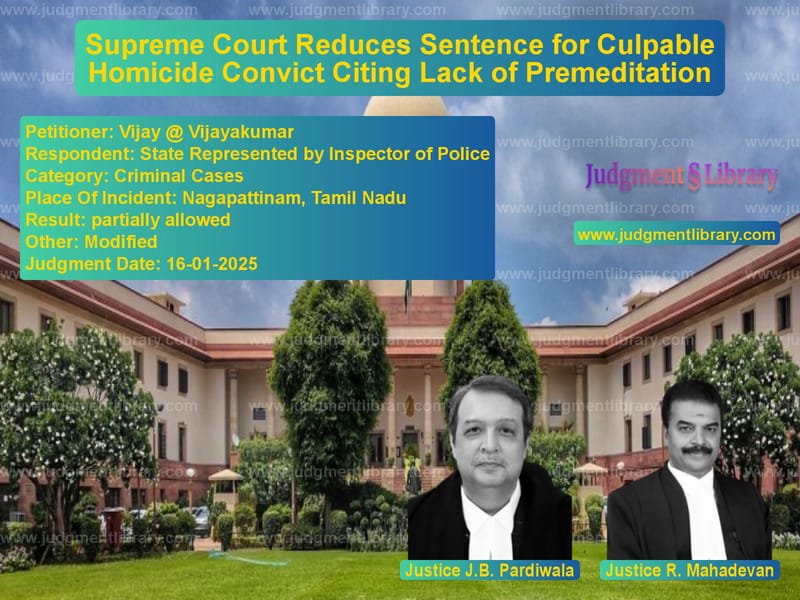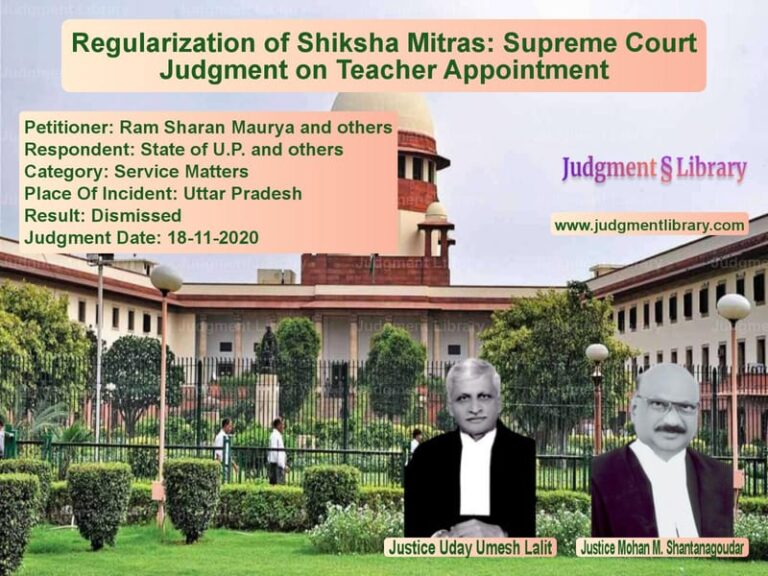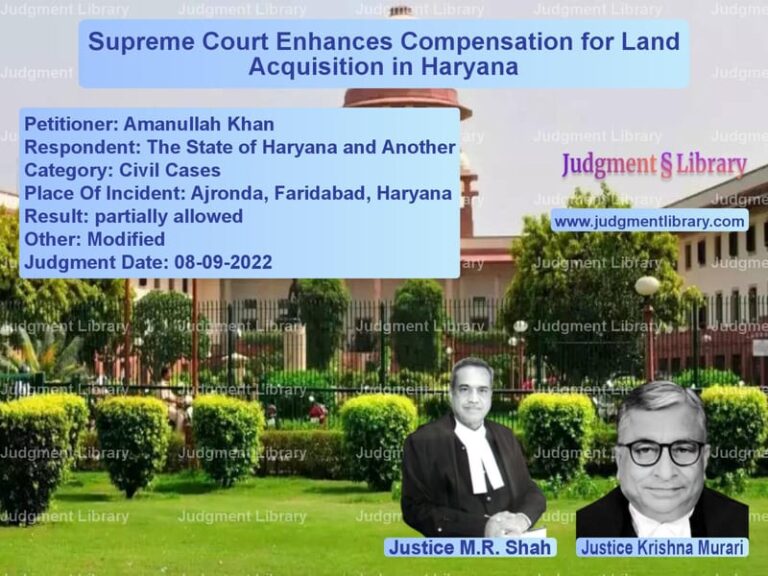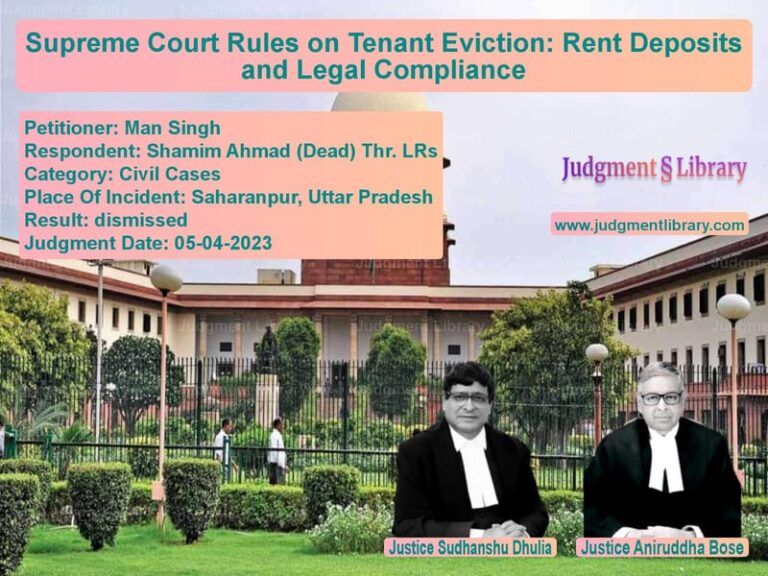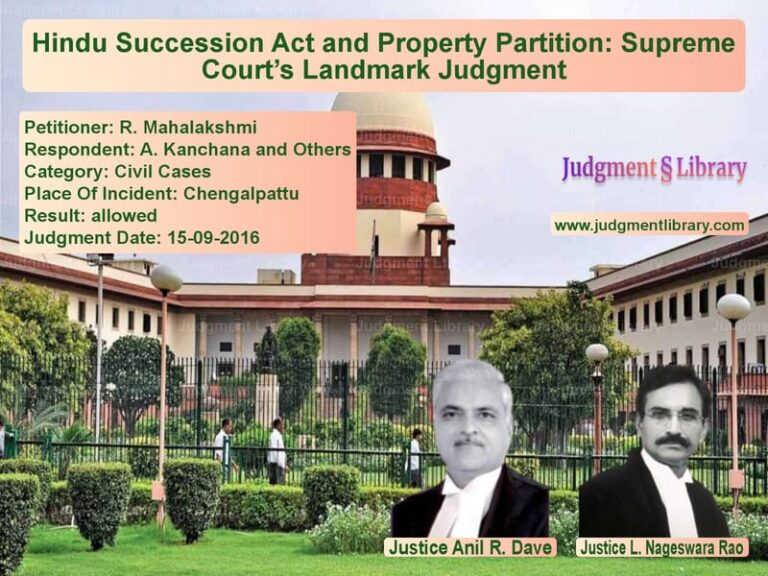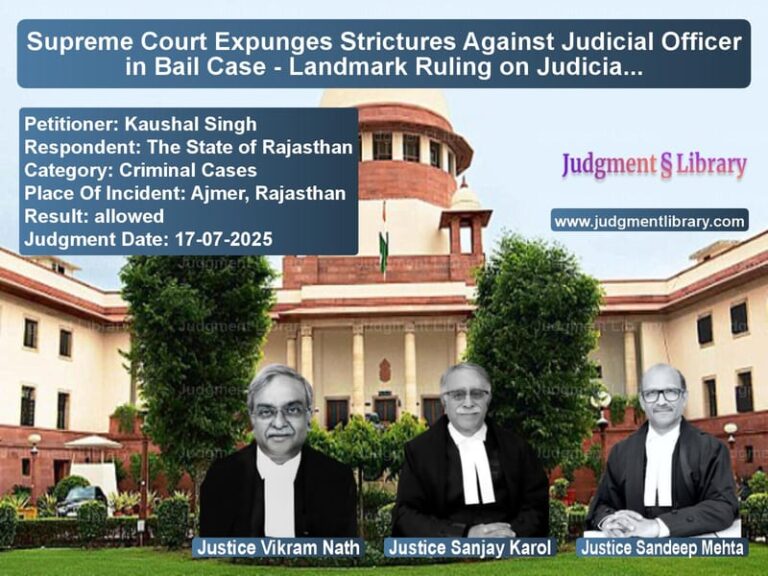Supreme Court Reduces Sentence for Culpable Homicide Convict Citing Lack of Premeditation
The Supreme Court of India has recently delivered a crucial judgment in the case of Vijay @ Vijayakumar vs. State Represented by Inspector of Police, where it reduced the sentence of a convict charged under Section 304 Part 1 of the Indian Penal Code (IPC). The case highlights key aspects of criminal law, including the interpretation of ‘grave and sudden provocation’ and the role of judicial discretion in sentencing.
Background of the Case
The case originated from an incident that occurred on the night of November 5, 2007, when Vijayakumar and his friends were returning from a movie. While resting beneath a bridge, they encountered the deceased, who was allegedly in a drunken state. The deceased picked an altercation with the accused, which escalated into violence. During the confrontation, Vijayakumar picked up a cement brick and struck the deceased on the head, leading to his death.
Subsequently, the accused attempted to destroy evidence by setting the deceased’s body on fire. A First Information Report (FIR) was lodged by the Village Administrative Officer (VAO), leading to Vijayakumar’s arrest.
Trial Court Conviction
The Sessions Court of Nagapattinam found Vijayakumar guilty under:
- Section 304 Part 1 IPC: Culpable homicide not amounting to murder.
- Section 201 IPC: Causing the disappearance of evidence.
He was sentenced to:
- 5 years of rigorous imprisonment for culpable homicide.
- 2 years of rigorous imprisonment for causing the disappearance of evidence.
High Court’s Decision
Vijayakumar appealed the judgment before the Madras High Court, which upheld the Trial Court’s ruling. The conviction and sentence remained unchanged.
Arguments Before the Supreme Court
Arguments by the Appellant (Vijayakumar)
The counsel for the appellant argued:
- The act was committed in the heat of the moment and was not premeditated.
- The deceased initiated the altercation and provoked the appellant.
- The appellant had no prior enmity with the deceased and did not carry any weapon.
- The act fell within the purview of ‘grave and sudden provocation’ under Exception 1 to Section 300 IPC.
- The appellant had already served over 4 years of imprisonment.
Arguments by the Respondent (State of Tamil Nadu)
The State opposed the plea, arguing:
- The accused had sufficient time to retreat but instead resorted to fatal violence.
- After the act, the accused attempted to destroy evidence, showing consciousness of guilt.
- The Trial Court and the High Court had correctly applied legal principles in convicting the accused.
Supreme Court’s Analysis and Judgment
1. Interpretation of ‘Grave and Sudden Provocation’
The Court examined whether Vijayakumar’s actions qualified as an exception under Section 300 IPC:
“It is not each and every provocation that will reduce the crime from murder to culpable homicide. The provocation must be both grave and sudden. The test to be applied is that of the effect of the provocation on a reasonable man.”
2. Lack of Premeditation
The Court found that the incident was spontaneous:
“The act was not pre-planned or premeditated. The appellant had no weapon in his hands and used a cement stone lying at the scene.”
3. Proportionality of Reaction
The Court noted that while the deceased initiated the altercation, the appellant’s reaction was excessive:
“A reasonable person may retaliate but not in a manner grossly disproportionate to the provocation.”
4. Attempt to Destroy Evidence
Despite reducing the sentence, the Court condemned the act of setting the body on fire:
“The attempt to destroy evidence is a serious offense that cannot be overlooked.”
Final Judgment
The Supreme Court upheld the conviction but reduced the sentence:
“While upholding the conviction, we reduce the sentence to the period already undergone.”
Conclusion
This judgment underscores the balance between strict legal interpretations and judicial discretion. It emphasizes that courts must consider the specific facts of each case, including provocation, proportionality, and the accused’s conduct post-offense. By reducing the sentence, the Court acknowledged the lack of premeditation while affirming accountability for the crime.
Petitioner Name: Vijay @ Vijayakumar.Respondent Name: State Represented by Inspector of Police.Judgment By: Justice J.B. Pardiwala, Justice R. Mahadevan.Place Of Incident: Nagapattinam, Tamil Nadu.Judgment Date: 16-01-2025.
Don’t miss out on the full details! Download the complete judgment in PDF format below and gain valuable insights instantly!
Download Judgment: vijay-@-vijayakumar-vs-state-represented-by-supreme-court-of-india-judgment-dated-16-01-2025.pdf
Directly Download Judgment: Directly download this Judgment
See all petitions in Bail and Anticipatory Bail
See all petitions in Murder Cases
See all petitions in Legal Malpractice
See all petitions in Judgment by J.B. Pardiwala
See all petitions in Judgment by R. Mahadevan
See all petitions in partially allowed
See all petitions in Modified
See all petitions in supreme court of India judgments January 2025
See all petitions in 2025 judgments
See all posts in Criminal Cases Category
See all allowed petitions in Criminal Cases Category
See all Dismissed petitions in Criminal Cases Category
See all partially allowed petitions in Criminal Cases Category

